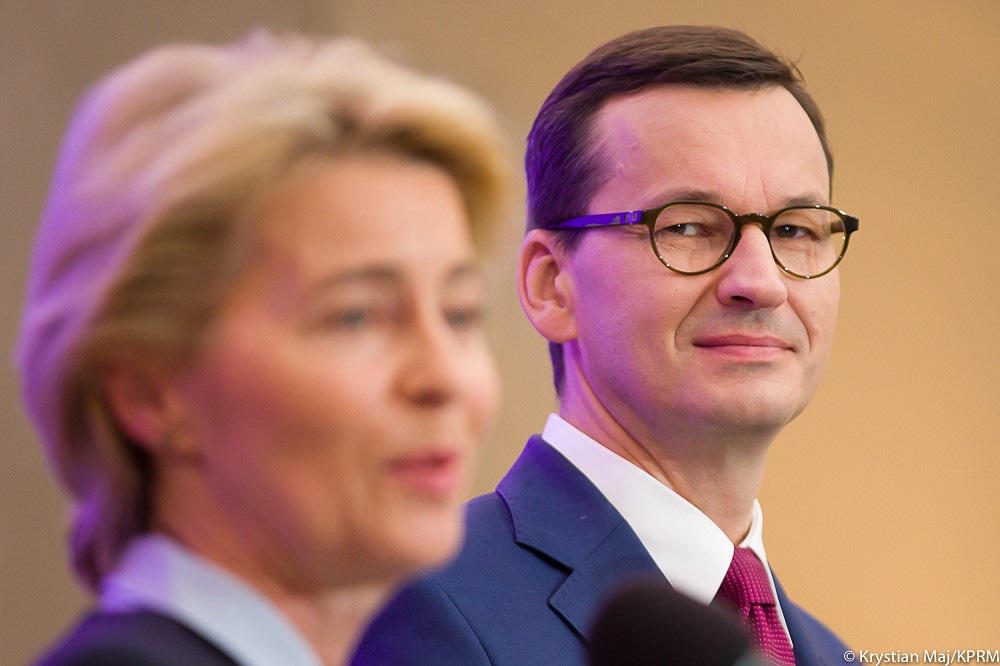The European Commission has given Poland until 16 August to suspend its disciplinary chamber for judges – as ordered by the Court of Justice of the European Union (CJEU) – or face financial penalties.
The Polish government, which has previously said that it is “not planning” to implement the rulings, responded to today’s ultimatum by saying it will “analyse” the commission’s demands. However, a deputy justice minister accused Brussels of “acting in bad faith and violating the [EU] treaties”.
The commission today also published its annual report on the rule of law in individual member states. Its chapter on Poland expressed “serious concerns” over the independence of the judiciary, corruption, media freedom, measures taken in response to the COVID-19 pandemic, and women’s and LGBT rights.
“The European Commission decided today to authorise [Justice] Commissioner [Didier] Reynders to use measures to induce Poland to comply with the CJEU’s ruling,” said commission vice president Věra Jourová. “We sent a letter to Poland on this matter.”
“Poland should inform us about the planned measures in this matter by 16 August,” she continued, quoted by Onet. “If the request is not met, the commission will ask the CJEU to impose a fine on Poland.”
“Poland has one month to respond to our demand; it must respect the decisions of the CJEU,” added Reynders. “We will be guided by the primacy of EU law in all member states. We will use all means to stop negative changes in EU countries.”
Today we sent a letter to Poland, asking Poland to explain how it applies the interim measures and recent ruling of the CJEU to safeguard judicial independence.
The @EU_Commission will not hesitate to make use of its powers under the Treaties.— Ursula von der Leyen (@vonderleyen) July 20, 2021
Last week, in rulings issued on Wednesday and Thursday, the CJEU first ordered Poland to suspend all activity of its disciplinary chamber, and then found that the chamber – which “does not provide all the guarantees of impartiality and independence” – is in violation of EU law.
However, the Polish Constitutional Tribunal – which is widely seen as being under government influence – also ruled last week that Poland could ignore CJEU interim rulings regarding the functioning of its judiciary.
Meanwhile, the chief justice of Poland’s Supreme Court – in which the disciplinary chamber is based – also said that it would continue to function. As such, the government, which argues that the EU has no right to intervene in the judicial affairs of a member state, said it was “not planning” to implement the rulings.
In response to today’s development, the government’s spokesman, Piotr Müller, said that they would “analyse the documents presented by the European Commission” and “initiate appropriate dialogue with” Brussels.
However, deputy justice minister Sebastian Kaleta, who belongs to a hardline junior member of Poland’s ruling coalition, was more blunt in his response, and rejected the idea of further talks.
“This dialogue has been going on for three years…it’s like talking to a brick wall,” Kaleta tweeted. “The European Commission acts in bad faith, violating the norms of the treaties and ignoring the Polish constitutional order. Further invitations to talks legitimise these actions.”
Ten dialog trwa od 3 lat. Jest jałowy, żadne argumenty, dowody na podwójne standardy to rzucanie grochem o ścianę.
KE działa w złej wierze, z naruszeniem norm traktatów oraz ignorując polski porządek konstytucyjny. Dalsze zapraszanie do rozmów to legitymizacja tych działań. https://t.co/b9ZqO1gqEu
— Sebastian Kaleta (@sjkaleta) July 20, 2021
Separately, the European Commission today issued its annual rule-of-law report, assessing all countries in the bloc. Like last year, it highlighted a number of problems with regard to Poland.
“Reforms of the Polish justice…continue to be a source of serious concerns,” wrote the commission. They have “increased the influence of the executive and legislative powers over the justice system to the detriment of judicial independence.”
It added that “there are risks as regards the effectiveness of the fight against high-level corruption, including a risk of undue influence on corruption prosecutions for political purposes”.
The report also noted that “recent developments on the Polish media market risk reducing media pluralism”, including the purchase of hundreds of media outlets by a state oil firm and doubts over the renewal of a broadcasting licence for TVN, Poland’s largest private television network.
“Since 2020, journalists’ professional environment has deteriorated, with use of intimidating judicial proceedings, growing failure to protect journalists and violent actions during protests, including from police forces,” the commission added.
Its chapter on Poland also noted that many government measures in response to the pandemic have been found unlawful by courts. Meanwhile, “civil society space…has been affected further by general problems concerning women’s rights, and by attacks on LGBTI groups“.
Main image credit: Krystian Maj / KPRM (under public domain)

Daniel Tilles is editor-in-chief of Notes from Poland. He has written on Polish affairs for a wide range of publications, including Foreign Policy, POLITICO Europe, EUobserver and Dziennik Gazeta Prawna.




















